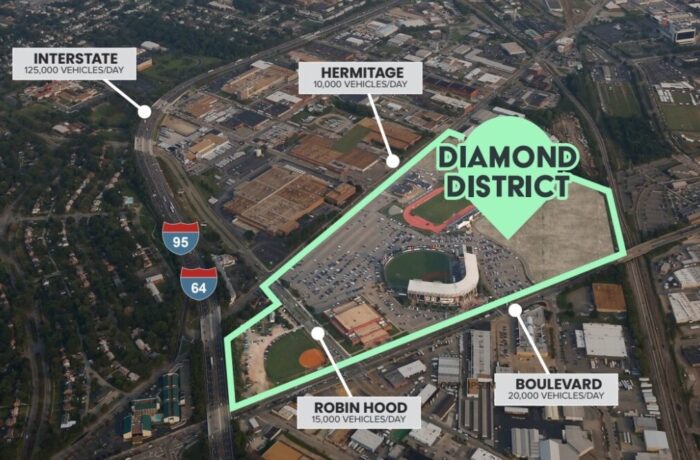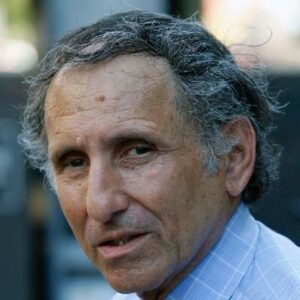Diamond District financing pivot prompts lawsuit seeking referendum

The 67-acre site is bordered by Arthur Ashe Boulevard, Hermitage Road, the interstate and the railroad tracks.
Less than 24 hours after authorizing a new financing plan for the ballpark-anchored Diamond District development, Richmond City Council and Mayor Levar Stoney have been hit with a lawsuit challenging the action.
Local attorney and activist Paul Goldman filed a lawsuit Thursday challenging council’s approval a day earlier of ordinances allowing the city to issue $170 million in bonds to finance the new stadium for the Richmond Flying Squirrels and infrastructure improvements for the $2.4 billion mixed-use development’s first phase.
The funding approach, which puts the city on the hook to repay the bonds should the stadium not be built or the larger development fail, is a change from a previous plan to issue non-obligation bonds through a community development authority (CDA) and with collateral from developer Diamond District Partners.
The move is projected to save the city $215 million in debt costs over the 30-year length of the loans, while also capturing $24 million in state sales tax incentives that are set to expire July 1. The $170 million in bonds would consist of $130 million in general obligation bonds to fund the ballpark and $40 million in lease revenue bonds for the infrastructure improvements.
Goldman, who has called for the bonds to be decided through a referendum of city voters, also filed a motion in Richmond Circuit Court seeking a preliminary injunction hearing and temporary restraining order to delay the bond issuance and provide direction from the court on how Goldman can properly petition and collect signatures to require a referendum. Goldman argues that such details are unclear in the city’s charter.
In an interview Monday, Goldman said he had requested those details from council and, if they weren’t provided, planned to file the lawsuit to get answers from the court. He said the amount of the bond issuance necessitates a referendum, but that state law only requires one with counties, not cities.
“If this was being done in the county, the voters would have the right of the referendum automatically. That’s state law. But cities, for some reason, like Richmond, it’s not automatic here,” Goldman said.
“What I’m asking is based on the fact that the counties can do this, and based on the fact that it’s the democratic way,” he said. “This is the same crowd that wanted the casino that nobody wanted. If it wasn’t for the referendum, there would be a casino.”
Goldman similarly challenged the proposed casino in South Richmond that city voters rejected in a referendum, twice.
In a statement Thursday, Lincoln Saunders, Richmond’s chief administrative officer, was dismissive of Goldman’s suit challenging the Diamond District ordinances.
“Paul Goldman is at it again,” Saunders said. “By filing a frivolous lawsuit that flies in the face of the will of the residents who have been very clear that not only do they want the Squirrels to remain in Richmond but desire the much needed development, housing and additional jobs that come along with building a world-class stadium.
“This meritless and undemocratic maneuver is yet another Goldman move to make Richmond lose the Squirrels and cost residents over $24 million. Needless to say, the City will continue the work and move this game-changing project forward,” Saunders said.
While he said the city charter does not specify the number of signatures required for a referendum or how they can be certified, Goldman said it does allow for citizens to petition for an “optional referendum,” a process that he said could play out in the time before the ordinances become legally effective.
If a referendum is put on the ballot in November, Goldman said the bonds could not be sold before then. The city is changing its funding approach in part to be able to issue the bonds in June, to start site work earlier and to capture the $24 million in state tax incentives before they expire in July.
The timing is integral to the city’s planned schedule to deliver the new stadium in time for the 2026 baseball season. Major League Baseball, which oversees minor-league venues like The Diamond and is requiring all pro venues to meet new facility standards, had imposed a 2025 deadline but is allowing Richmond more time in light of the project’s progress.
Goldman said the city and MLB should shoot for 2027 instead, to allow citizens time to weigh in on the funding change that was announced a month ago.
“Give us some time,” Goldman said. “There’s plenty of fiscally responsible ways to do this. There is a way to do it and get it done by 2027.”
Goldman’s lawsuit lists as defendants Mayor Stoney, all nine councilmembers, Circuit Court clerk Edward Jewett and city clerk Candice Reid. It alleges three counts including violations of the state constitution and city charter, and violation of Goldman’s First Amendment rights. It requests injunctive relief, precise language for the petition and a hearing on the three counts.
In addition to authorizing the bond issuance, the ordinances approved by council on Wednesday authorize the city to enter into an agreement with Diamond District Partners, the private development team led by Thalhimer Realty Partners and Loop Capital, to purchase and develop the land and non-ballpark portions of the first phase on their own dime.
The 10,000-seat baseball stadium would be developed by the Flying Squirrels’ ownership group and consultant Machete Group. The city would own the stadium.
City bonds would cover construction of the $110 million stadium as well as costs to design, acquire and equip it. The infrastructure bonds would be paid for with lease payments from the Flying Squirrels, which would total $66 million over 30 years.
Supporters of the new financing setup maintain that the savings to the city, as well as the popularity of the Scott’s Addition area and of the Richmond Flying Squirrels, make the risk to the city a safe bet. Opponents, such as Goldman, contend that the change is being pushed and rushed since the ordinances were introduced last month.
The post Diamond District financing pivot prompts lawsuit seeking referendum appeared first on Richmond BizSense.
Recent Posts
GET MORE INFORMATION

Agent | License ID: 0225209440










